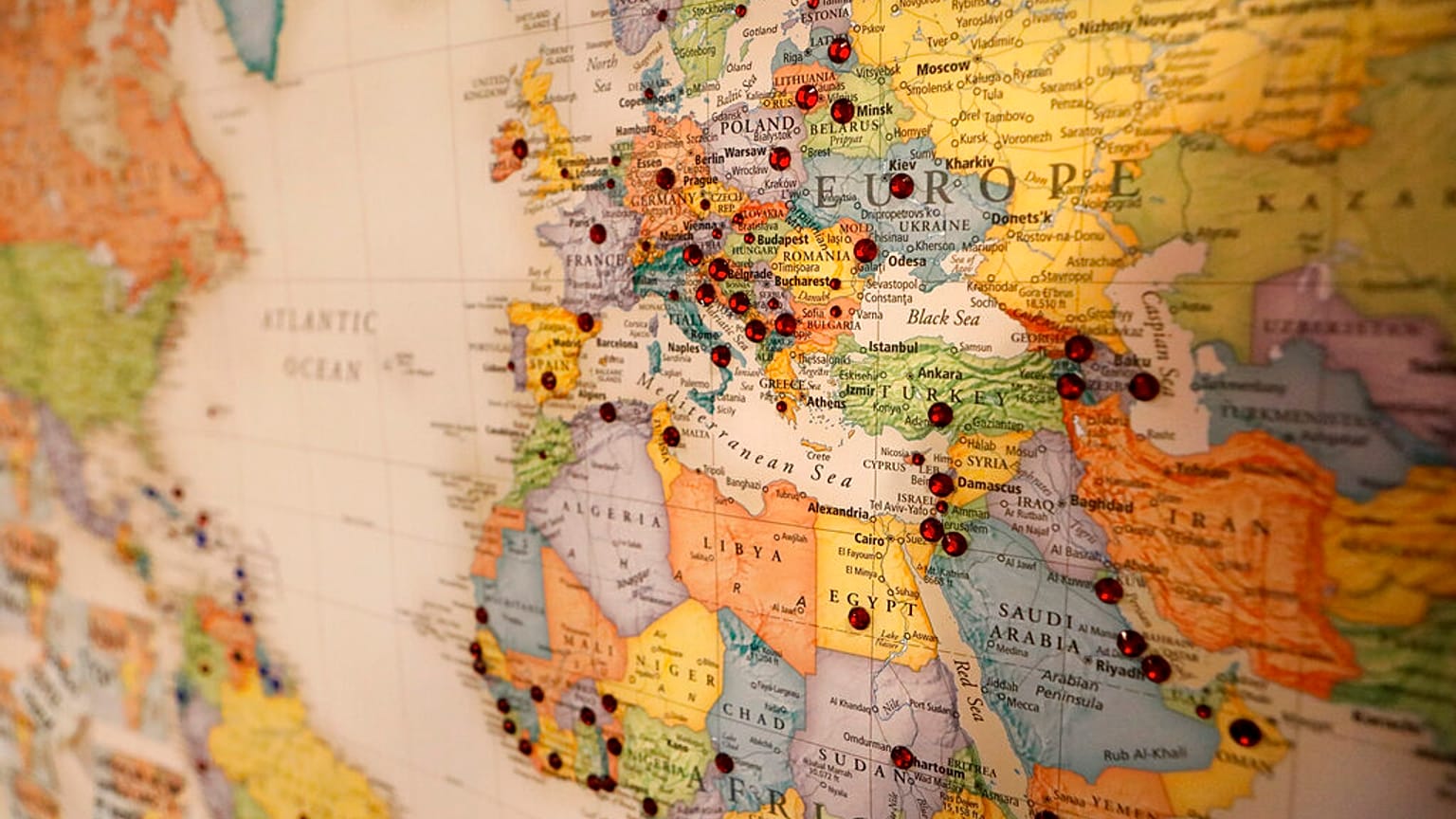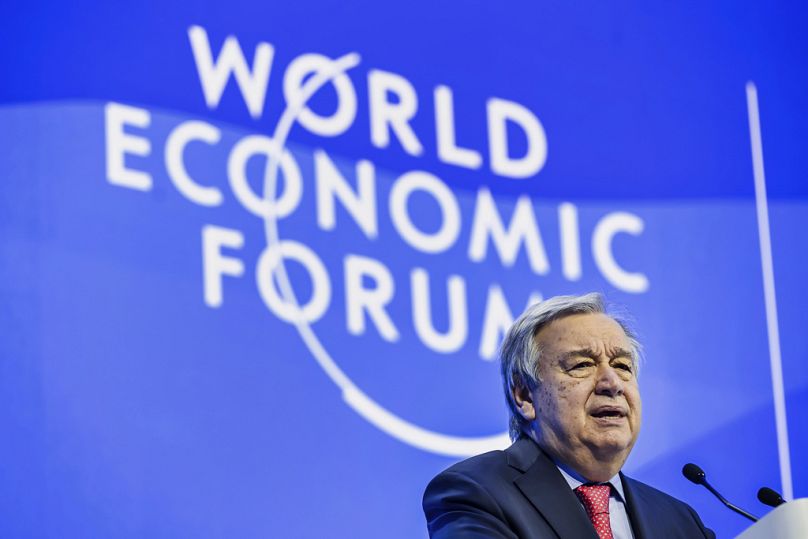The World Economic Forum’s Global Risks report 2024 believes false information, rising conflicts and economic uncertainty are among the most widespread risks facing this year
The World Economic Forum (WEF)’s Global Risks 2024 report, published on 10 January, sheds some much-needed light on some of the key risks and issues the global economy is likely to face this year and in the coming years.
 ADVERTISEMENT
ADVERTISEMENT
 ADVERTISEMENT
ADVERTISEMENT
According to the 2024 Global Risks Perception Survey: "The majority of respondents (54%) anticipate some instability and a moderate risk of global catastrophes, while another 30% expect even more turbulent conditions. The outlook is markedly more gloomy over the 10-year time horizon, with nearly two-thirds of respondents expecting a stormy or turbulent outlook."
The survey takes into account the views of nearly 1,500 leaders across a variety of sectors, including business, academia, civil society and government, as well as more than 200 thematic leaders.
Currently, the world we live in is seen as increasingly fraught, with polarising narratives, as well as soaring costs of living and higher interest rates in several parts of the world. Dwindling resources and simmering geopolitical tensions have also caused a number of conflicts across the world.
Adding to that, environmental crises, such as extreme weather events, have further destabilised both economies and companies, eroding away profit margins and backlogging supply chains. On the other hand, with the continued impact of the COVID-19 pandemic, as well as the energy crisis and inflation, climate change and carbon neutrality efforts across the globe have slowed down considerably.
A backdrop of global economic anxiety and rapid technological changes completes the picture.
Among these, the unprecedented rise of false information, as well as increased conflict and economic uncertainty, is likely to be the most predominant risks seen this year.
False information
According to 53% of respondents, AI-generated false misinformation and disinformation is considered to be one of the highest risks over the next two years, says the Global Risk Perceptions Survey. This includes censorship and surveillance and safety issues with frontier technologies, as well as AI technologies. It also includes cyber insecurity and technological power concentration.
False information has become an escalating source of worry across the globe, with the increasing availability and access to social media and questionable sources of news and other information. As seen in both the Russia-Ukraine war and the Israel-Hamas conflict, artificial intelligence (AI), amongst other technology tools, was used liberally by both sides to generate false and misleading images, to garner support, build troop morale, and spark action.
In the past, in non-conflict scenarios, both misinformation and disinformation have led to an infodemic, with some countries, such as Russia, North Korea and China using them while reporting on military strength, conflict progress, COVID-19 cases, youth unemployment and human right abuses, amongst other things.
In some cases, these tools are also used to incite anger towards a government or ruling body, especially in times of political strife and economic hardships such as a rising cost of living crisis.
In 2024, false information may continue to create instability and mistrust in governments and regulatory bodies, as well as media sources, respondents believe. Not only could this lead to even more polarised views, in 46% of survey respondents’ opinion, but it could also spark more skirmishes and conflicts, especially in countries with already unstable economies. Ideological violence is also at risk of increase.
Misinformation might also significantly impact and cause chaos in electoral processes happening in several countries both this year and next year.
While some governments may take some steps in trying to lock down the sources of misinformation, this could be taken too far, with 16% of respondents believing censorship and erosion of free speech could potentially be an issue this year.
Other governments could face risks from inaction, or too slow action, while newer forms of crime, such as stock market manipulation using AI and deepfake pornography spread.
This year, the World Economic Forum’s Davos summit will also be focusing on how to rebuild trust in an increasingly fractured world.
Rise in conflict
According to 25% of respondents, escalation or outbreak of interstate armed conflicts is likely to be one of the top risks this year. 19% believed attacks on critical infrastructure could be a problem too, with 12% being worried about an accidental or intentional nuclear event. Some 11% believed there might be an increase in violent civil strikes and riots. This year, interstate armed conflict was a new entrant in the survey list of risks.
In 2024, conflict escalation could be seen in three vital hotspots. These include Israel, Ukraine and Taiwan. If so, this could have potentially far-reaching economic, geopolitical and security consequences.
The report highlights: "All three areas stand at a geopolitical crossroads, where major powers have vested interests: oil and trade routes in the Middle East, stability and the balance of power in Eastern Europe and advanced technological supply chains in East Asia.
Each could lead to broader regional destabilisation, directly drawing in major power(s) and escalating the scale of conflict. All three also directly involve power(s) reckoned to possess nuclear capabilities."
Furthermore, socioeconomic, ideological and environmental themes could give rise to renewed skirmishes, further eroding economic and political stability for a number of countries. A more multipolar world could also set the stage for a variety of smaller, but regionally relevant, factions and powers to take control. As each of these are likely to come with their own agendas, conflict resolution may become increasingly more difficult.
Escalated conflicts also lead to more severe humanitarian crises, putting additional burden on other countries to respond with aid, or face criticisms. In several cases, with countries such the US, this may also require additional military deployment.
Frozen or paused conflicts are at risk of starting again, the survey suggests, through spillover effects and conflict contagion, include Kashmir, the Balkans, Syria and Libya, amongst others. The growing divide and unrest between the Global North and Global South regarding the effects of climate change, the energy crisis and cost of living could also become significantly worse this year.
Economic uncertainty
Some 42% of respondents believe the rising costs of living will still be a problem in 2024, with 33% anticipating an economic downturn. Some 25% believed supply chains for critical goods and resources are likely to be disrupted, while 18% think the same for food supply chains and 14% for energy supply chains.
A skills and labour shortage is expected to occur, according to 13% of respondents, while 14% see public debt distress as a potential problem. Institutional collapse within the financial sector is a prediction for 7% of respondents with a housing bubble burst and a tech bubble burst scenario each getting 4% of the votes.
Over the past few months, a number of major central banks, such as the US Federal Reserve, the European Central Bank and the Bank of England have aggressively tightened monetary policy. While this may have brought inflation somewhat under control and narrowly avoided global recession so far, the near-term outlook remains cloudy due to rapid domestic developments in key markets and geopolitical events.
Demand uncertainty and supply-side pressures continue to be two of the top economic themes this year, which could lead to renewed inflation and a delay in loosening monetary policy. Slowing economic growth and the higher cost of debt is seen as likely to impact developing countries, with smaller and mid-sized companies being the hardest hit.
An increasing risk of sovereign debt crises in countries such as Ethiopia, Tunisia, Egypt, Lebanon, Ghana and Pakistan may also be seen this year.
However, the report does not just focus on what it sees as the potential problems of 2024, it also outlines how best to respond to these global risks. These are highlighted below.
Localised strategies
Localised strategies are one of the quicker, easier and more efficient ways to better prepare for and mitigate the impact of several of these global risks. Examples of these include China imposing laws on watermarking AI-generated pictures and content, which could help in countering the effects of misinformation.
Furthermore, localised strategies do not need to go through overtly long global approval processes or cross-border coordination. They can essentially be applied to almost every industry in a country. For example, mitigation and management strategies would be applicable for natural events such as earthquakes, heatwaves, floods and wildfires amongst others.
This includes upgrades and improvements in healthcare and infrastructure, as well as more investment in things such as wildfire management, relocation assistance and more. Public awareness and education initiatives can also go a long way in strengthening things such as vaccine compliance.
Similarly, financial assistance and stimulus measures can help with both damage from natural events, as well as economic situations such as higher cost of living, mortgage rates and energy prices.
Breakthrough endeavours
The Global Risks Report notes: "In some cases, the action of an individual or entity can be enough to provide a 'breakthrough' development to address risk or to serve as the positive tipping point to an alternate 'safe state'. These breakthrough endeavours are as equally relevant for preventing or mitigating the likelihood of risk as they are for lessening the impact."
These are usually in healthcare, technology, industry or risk identification, amongst others. One of the more recent examples would be the development of the COVID-19 vaccine by a group of pharmaceutical companies. Others include tools for tracking and identifying tectonic activity, such as seismometres, through which earthquake, volcanic activity and tsunamis can be predicted.
Breakthrough endeavours usually require significant investment in research and development, but can be worthwhile, as they can address and mitigate a number of global risks. These include extreme weather events, infectious diseases, adverse effects of frontier technologies, cybersecurity and chronic health conditions, amongst others.
Due to this, policy makers in 2024 may need to maintain a risk-reward attitude when it comes to investing in research and development and supporting endeavours, by considering them to be a financial risk to be taken today, but with the potential of a better tomorrow.
Collective actions
While combatting and reducing the impact of global risks this year, companies, individuals and governments may see a greater need to join ranks together, towards common goals and initiatives.
This could include micro and major efforts working together at conserving energy and fighting climate change. In this case, individuals focus on relatively small actions such as switching off lights and appliances while not in use, or moving to electric vehicles. This could also be about choosing to travel more sustainably, or opting for organic, locally sourced products.
On the other hand, companies and governments might focus on larger projects such as shifting towards renewable energy for their operations, reducing their carbon footprint and investing more in climate change goals. Although the actions are different in scale and size, they are all towards the same goal.
Over time, these actions can have a snowball effect and also balloon into larger community-driven efforts to address inevitable or very frequent events. Examples include Bangladesh’s Cyclone Preparedness Programme and Japan’s Community-Based Disaster Risk Management.
Corporations also play a vital role in the economic and social fabric of a country, with collective action in the form of corporate strategies having the power to address labour shortages, unemployment, supply chain disruptions, lack of economic opportunity and economic downturn, amidst others.
Cross-border coordinations
Cross-border coordination and cooperation remains one of the most important ways to avoid or lessen global risks. This can be done through a variety of ways, such as nuclear non-proliferation agreements, upholding minimum standards relating to global issues such as climate change, and international agreements for matters such as free trade and security among others.
Global agreements can significantly reduce the risks of chemical, biological and nuclear hazards, as well as geoeconomic confrontation, interstate armed conflicts, critical changes to Earth systems, terrorist attacks and the concentration of strategic resources.
The report emphasises the importance of open and cooperative dialogue and agreements, stressing they are especially vital in a post-Brexit, post-pandemic world, where geopolitical fragmentation is increasingly on the rise.



















